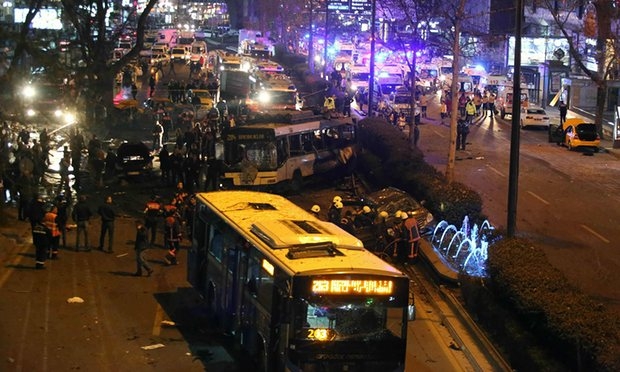Massive Car Bomb in Turkish Capital Kills Dozens
ANKARA – A massive car bomb detonated Sunday evening in the heart of Turkey’s capital Ankara left at least 34 dead, government officials said in a statement released Monday.
Turkey’s Health Minister Mehmet Muezzinoglu said at least 124 were also wounded in the attack.
There were no immediate claims of responsibility, though Turkish authorities said a criminal investigation is underway.
According to Turkish security officials, a car packed with explosives was detonated in Kizilay Square, central Ankara’s most popular commercial and entertainment hub.
Turkish authorities immediately imposed a ban on local news media coverage of the bombing. Following the same protocol as previous attacks, a court in Ankara issued an order blocking all access to social media in an effort to prevent the dissemination of photographs from the scene of the attack.
Local law enforcement officials have thus far refused to speculate on who may be responsible for the attack and would not comment on potential motives following an emergency security meeting with Prime Minister Ahmet Davutoglu.
Turkish President Recep Tayyip Erdogan, however, was quick to lay blame on Kurdish rebels, who he claims are lashing out at his government after having suffered several setbacks in their fight against government forces in the country’s volatile southeast.
The attack is the latest in a serious of increasingly vicious terrorist incidents that have left hundreds dead in recent months.
The Turkish government has consistently blamed Kurdish rebel groups, including the Kurdistan Workers Party – or PKK – an internationally recognized terrorist organization that has fought a bloody insurgent war against the Turks for three decades.
The Kurds, a 32 million-strong Indo-Iranian ethnic group unrelated to either the Turks or Arabs, have waged intermittent wars against their respective ruling governments over the last century in attempt to forge an independent Kurdistan.
Though Turkey has attempted to contain the violence and humanitarian crises emanating from the nearby Syrian Civil War and rise of ISIS in the upper Mesopotamian plain, a series of deadly attacks inside the country has forced Erdogan and his government to actively retaliate against PKK groups and their Kurdish allies in Syria, the People’s Protection Units; better known as the YPG.
Erdgoan and his government view the PKK and YPG and existential threats, as both call for the establishment of an independent Kurdish state stretching across the northern provinces of Syria and Iraq, extending into eastern Turkey until the Iranian and Armenian borders.
Further complicating the issue is the YPG’s alliance with the United States and other Western powers, which heavily arm and train the group as the only viable, indigenous force capable of fighting against ISIS.
Turkey, a key NATO member and strategic ally of the West in the region, have vowed to destroy both the PKK and YPG, whom they see as illegal terrorist groups.
The authoritarian Erdogan has gone so far as to label both the PKK and YPG as latent allies of the Islamic State, as they are sworn enemies of his government.
Turkey’s armed forces have relentlessly bombed both Kurdish groups in the last six months in an attempt to halt any territorial gains that could legitimize a potential contiguous Kurdish state.
Immediately following Sunday’s attack, Turkey announced a fresh round of air strikes against Kurdish basecamps in northern Iraq.
Turkey’s tightly controlled state-run media claims nine F-16s and two F-4s raided 18 PKK positions in northern Iraq, including the headquarters of the group’s leadership in the Qandil Mountains.
State security service officers, meanwhile, carried out raids in the southern city of Adana, detaining 38 suspected PKK rebels. Up to 15 Kurdish suspects were also detained in Istanbul, according to local media reports.
Photo: AFP/Getty












